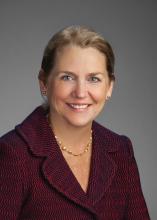As a Fellow of the American College of Surgeons (ACS), only you can recall the personal sacrifices you have made to attain the skills and knowledge necessary to enjoy the privilege of being a surgeon – years of missed time with family and friends, sleepless nights, and endless formative hours of deep experiential learning in the hospital. Someone else could have been there instead; you could have made a different career choice. But, no – surgery chose you, and you dove in. Thank you, thank you.
I hope you never lose sight of the lives you touched during those “lost” times – injured people, previously unknown neighbors with deadly diseases, or simply patients needing a little “repair.” People with a surgical disease are experiencing a rare life event: an operation. Never forget that each of those individuals, each patient, came to you – you personally – to help them.
The greatest reward in our profession is the gift of trust we receive from our patients. It is priceless. What we get to do for the people who need us is a joy and a privilege for us.Challenges
Regrettably, however, at times the cherished bond between a surgeon and a patient can get lost in our busy, burdened lives. It can get lost in physical fatigue, regulatory hoops, frustrations of the electronic health record, contract negotiations, challenging reimbursement policies, and on and on.
Add to that list other challenges that will surely arise in the course of your career: You will face various forms of threatened obsolescence in knowledge, skills, and technology. You will age. You will suffer personal tragedy and loss. You will become ill. That you may stumble when facing such challenges is not a sign of weakness. It is life.
I believe there is a bit of light ahead as our health care industry begins to recognize that this thing we call burnout is not a personal failing, but rather a function of our flawed work environments – and a significant threat not only to the surgeon, but also to patient safety, quality of care, and institutional financial stability. An active voice and actions in these essential domains of our work environment are mission critical for our College, as are efforts that are pursued on many fronts by Fellows and professionals in the Division of Advocacy and Health Policy in Washington, DC, and the Divisions of Research and Optimal Patient Care, Education, and Member Services in Chicago, IL. Fostering an environment to optimally support the care of the surgical patient – and surgeons – is core business in all we do in the ACS.
Let’s tackle a few other challenges. First, consider your personal and society’s investment in surgical training. Getting you to this skilled and knowledgeable point reflects an investment of more than $1 million dollars in costs of medical school and graduate medical education, and inestimable time and effort.
Second, the dire anticipated shortage of surgeons of many disciplines – general surgeons, orthopedists, urologists – appears to be real. If we are to keep our surgical pipeline full, we need to offer careers that are attractive to men and women equally. The U.S. general surgery pathway has entering classes of 40% women; however, other high-demand disciplines, such as neurosurgery, orthopedics, and cardiothoracic surgery, have not yet attracted women to their ranks in sufficient numbers, despite the fact that 50% of our medical school graduates are women. We need to examine the pathways to those surgical disciplines to ensure that gender- and ethnicity-based barriers are receding. Efforts are underway to address these challenges by the leadership in these disciplines that our College can help with.
Although much has changed for women in surgery in recent years, there are still differences in the lives of many female surgeons compared to their male colleagues. They remain at risk for pay inequity, being in aggregate compensated 10-17% less than their male colleagues for equal work. Despite a mature gender pipeline in some surgical specialties, women are still less likely to rise to leadership roles in their group practices, hospital structures, professional organizations, and academic institutions. The ACS can serve as a professional home to develop strategies to highlight and remedy these imbalances.
Parenting, to engage as fully and successfully as one may wish, is a challenge for many who choose our careers, regardless of gender. However, for most female surgeons beginning a family, the first step often comes with pregnancy and infant care, conditions that we have yet to embrace and support as a societal good rather than an individual’s gauntlet to run. Given our long and arduous educational pathways, these women often find themselves starting a family, be it by pregnancy or adoption, at the same moment they are beginning their busy early years of practice. Policies and practices to support surgeons who choose parenthood in the workforce are sorely needed and will, in fact, benefit all in the long run.
Our College, with guidance from the Women in Surgery Committee and the Association of Women Surgeons, has advanced that goal, issuing a statement that acknowledges the need for appropriate pregnancy and parental leave and that clearly articulates that the choice to become a parent in no way diminishes a surgeon’s commitment to career. The next steps will be building the institutional, financial, and community infrastructure to foster success in both career and parenting for all.

